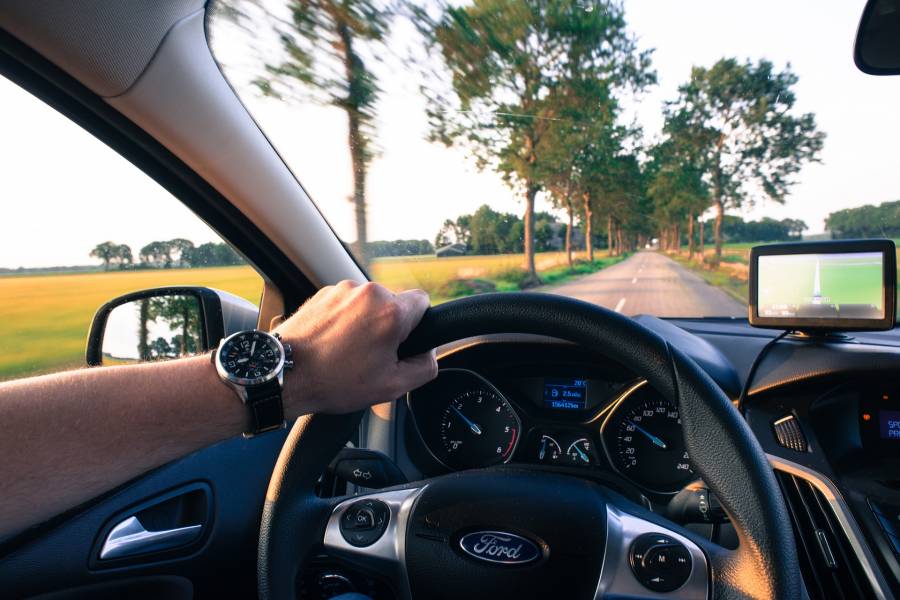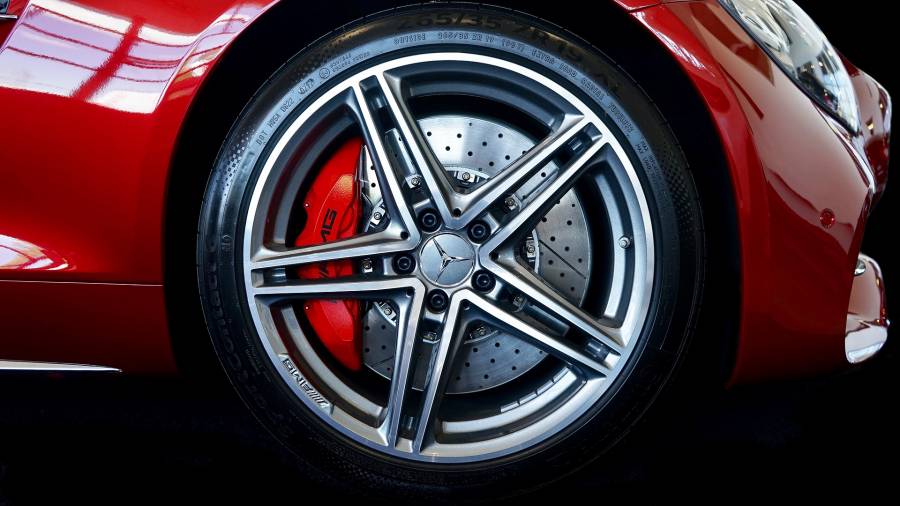Quick Navigation
The hydro-boost uses the hydraulic pressure to the brakes, which activates the brakes. Driving at high speed can be risky if your brake pedal goes to the floor.
The common reason for this is a brake fluid leak that results in fluid pressure loss.

You can quickly diagnose the brake fluid leak underneath the car if there’s a leak in the system.
How Does The Hydro-Boost Brake System Work?
Understanding the hydro-boost brake system can help you maintain a vehicle.
The brake pedal creates a mechanical force through the brake booster to amplify pressure on the master cylinder.
Hydraulic fluid pressurized through the master cylinder to the brake lines and stockings.
The fluid causes caliper pistons to press the brake pads in the vehicle with disc brakes. Pressure against the drum brake causes the car to slow or stop.
If your brakes suddenly stop working, you’ll need to act fast to avoid an accident.
A simple fix is to press your foot to the floor and keep it there until the brakes regain power. It works by creating a hydraulic connection between your foot and the brake pedal.
Why Does The Hydroboost Brake Pedal Go To The Floor?
The hydro-boost device has a hydraulic brake system that stimulates the vehicle’s braking power when the brakes are applied.
Additionally, a hydro-boost strengthens the hydraulic pressure of the brake system.
If you notice the brake pedal goes to the floor, you need to know what part of the brake system renders this issue.
The Hydro-boost brake pedal malfunction is caused by a loose or worn hydraulic fluid reservoir.
Brake Fluid Leakage
Brake fluid is essential in improving and maintaining brake power. The pressure to the brake pedal compresses the piston in the brake cylinder.
The increased pressure in the brake lines makes the brake fluid particles move to the caliper.
The brake pads squeeze the rotors because of the high pressure in the brake fluid. It generates friction, and the vehicle stops.
The pressure drops significantly with the loss of brake fluid. If a brake fluid leaks, there isn’t enough force to compress the piston.
Suppose you feel a leakage in any brake components lowers brake pressure after starting your car.
Defective Brake Master Cylinder
Sometimes, the brake pedal goes to the floor due to brake booster vacuum leakage. The brake pedal is linked to the master cylinder to cause hydraulic pressure.
As a result, it triggers brakes and pulls the fluid to the front wheels.
The sealed master cylinder maintains force and power, which drives the brake fluid to the calipers.
Additionally, it balances pressure to push the brake fluid towards the calipers.
Defective Brake Booster
If everything appears fine and the brake system is air-free, the brake booster may be faulty.
The power booster operates a braking process that gives power assistance when the driver presses the pedal.
The brake booster uses a vacuum line to balance fluid pressure in the braking system.
The faulty brake booster causes the pedal to move to the floor that stops the car completely.
Air Bubbles In Brake Lines
Mostly the brake pedal goes to the floor after replacing the new master cylinder. There is air in the brake lines if no air percolates after placing a new master cylinder.
The air blocks the efficient passage of brake fluid inside the brake lines and deteriorates the brake lines.
Press the brakes to maintain the pressure to the brake lines after bleeding the air from the brake fluid.

How To Address The Hydroboost Brake Pedal Going To The Floor?
There are many solutions to hydraulic brake failure that don’t involve buying a new car. To fix this problem, start looking at the flaw in the braking system.
Hydro boost brakes are the ultimate upgrade for your vehicle’s braking system.
Once you figure out why the hydro-boost brake pedal shifts to the floor, you can prevent it from happening again.
If you are having trouble with your brakes, it may be a good idea to get them tested out by a skilled person to be on the safe side.
If the fault is mechanical, a consultation with the manufacturer may be necessary.
Check Brake Lines And Calipers
When the brake pedal goes to the floor, there may be a leakage in any brake lines that outflows pressure in the brake system.
The brake fluid level can narrow the leakage in the brake system. Suppose your vehicle has a leaking wheel cylinder or brake caliper you need to replace.
Likewise, check the brake line flex stockings for cracking, which need replacement.
Check Brake Master Cylinder
The brake master cylinder has seals to close the oil inside. Due to the car’s age, it was causing brake fluid to leak.
A used brake master cylinder will not last long; it gets weaker over time.
The car’s combustion engine works like an air pump to create pressurized air inside the combustion chamber.
The brake booster takes advantage of the engine’s vacuum pressure to amplify the force on the brake pedal.
To slow down or stop the vehicle apply less pressure on the brake pedal.
However, if the brake booster is faulty, you need to use significant force for the master cylinder to pressurize brake fluid down the system.
As a result, the brake pedal travels below its standard throw, and the brake pedal goes to the floor.
Bleed The Brake System
Bleeding means excluding air bubbles from the hydraulic braking system. When air is circulating into the brake lines, the brake fluid cannot pressurize at the optimal condition.
Air can circulate the brake lines from the brake caliper and the master cylinder with rubber seals.
Close the air bleed screws before releasing the brake pedal; otherwise, air will get sucked into the braking system. Follow the step-by-step guide below to bleed brakes.
Check Brake Shoes And Axle Bearing
Check the rear brake shoes if the car has a drum brake system. The faulty brake shoes enlarge the air gap between the drum and the shoe.
As a result, the brake pedal travels below its standard throw.
Axle bearing holds the brake rotors in a fixed place. Sometimes, the brake rotors create an air gap between the brake calipers and the rotor.
So, the caliper fills with fluid to close the gap and push the brake pedal to the floor. Plough the brake pedal twice or more so that it returns to its normal function.
The braking system is essential for safe driving. Thus, troubleshoot as soon as you notice that the brake pedal goes to the floor.
Conclusion
There are two main reasons why the hydro-boost brake pedal goes to the floor.
Firstly, brake fluid leaks in the brake system, causing a loss of brake fluid pressure.
Secondly, the faulty brake master cylinder due to which the brake system will not respond accordingly.
Typical indications of brake system problems include:
- The brake pedal feels spongy
- The brake pedal goes to the floor
- The vehicle takes time to slow or stop than normal
Don’t ignore any problem with your braking system.
If you are confused about detecting the hydro-boost brake pedal faults, consult an expert for inspection.
Changing the brake fluid periodically and checking the brake hose for leaks is necessary to maintain the vehicle’s brake system in good condition!

Kevin has been hanging around cars and automobile magazines since he knew what a car is. He grew up in his father’s 1995 Mercedes E320 Wagon and Volkwagon Phaeton W12 2004. He rides his first car, a manual 1979 Porche 911SC.
Currently, he owns an Acura Integra GS-R. During his childhood, he showed a keen interest in how things actually work and fix them. This passion transforms into his eternal love for cars and bestows him an ideal position in one of the leading automobile companies; whenever he finds time, he takes out his Acura and opts for the longest possible route to find hidden wholesome pleasure in a road trip.
Want to read some of the articles written by Kevin? Head to our blog section to find out all the articles written by Kevin.



![Gas Gauge Goes Up And Down [Causes + Solutions] Gas Gauge Goes Up And Down [Causes + Solutions]](https://carsupercare.com/wp-content/uploads/2022/04/Gas-gauge-goes-up-and-down-Causes-and-Solutions.docx-150x150.jpg)


